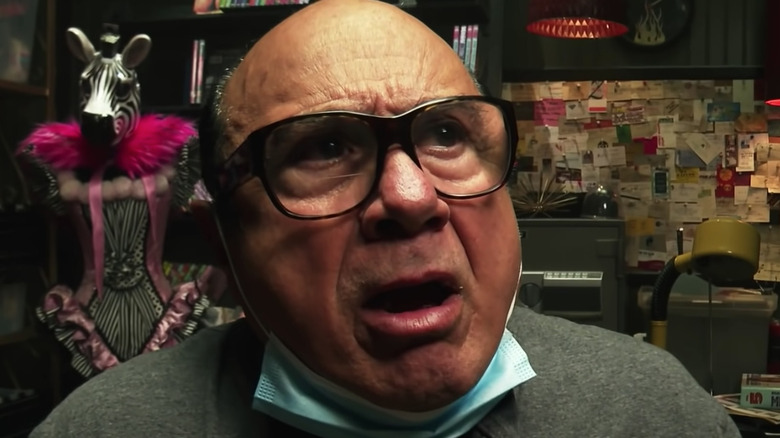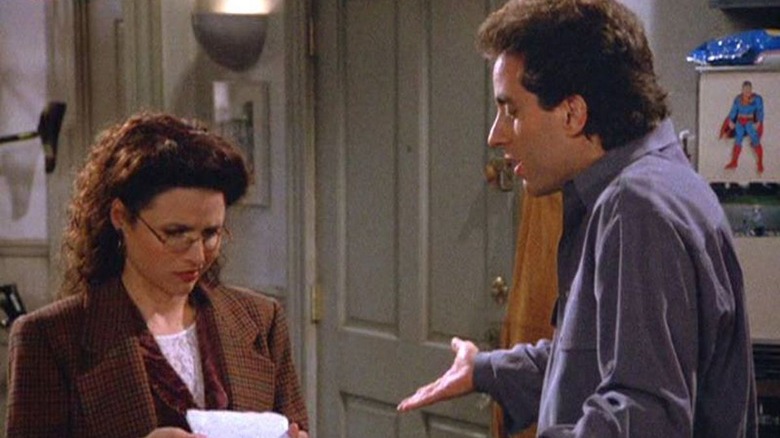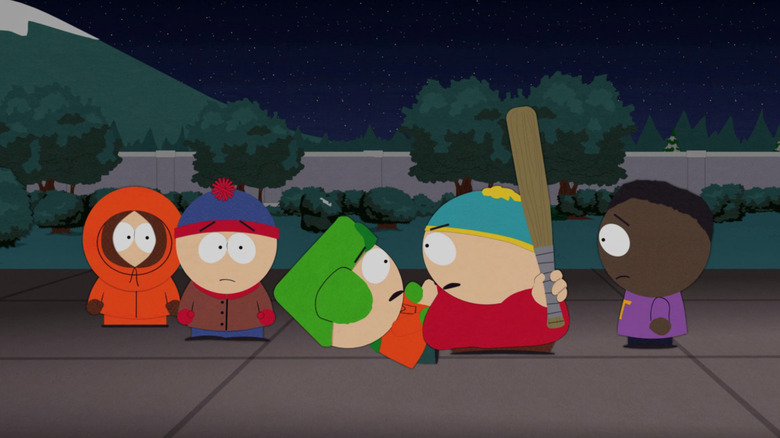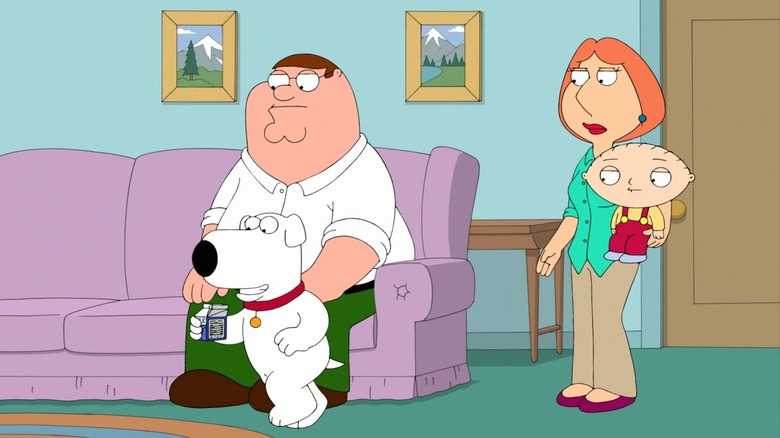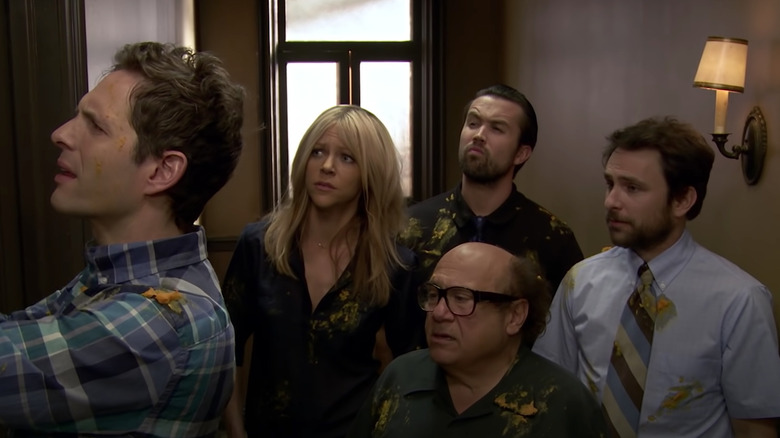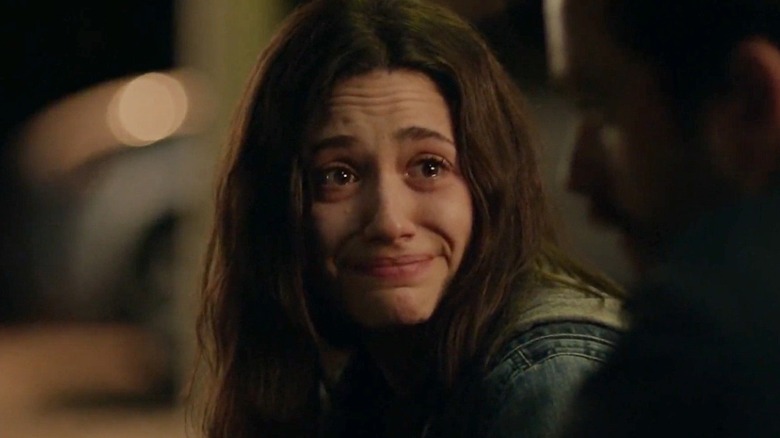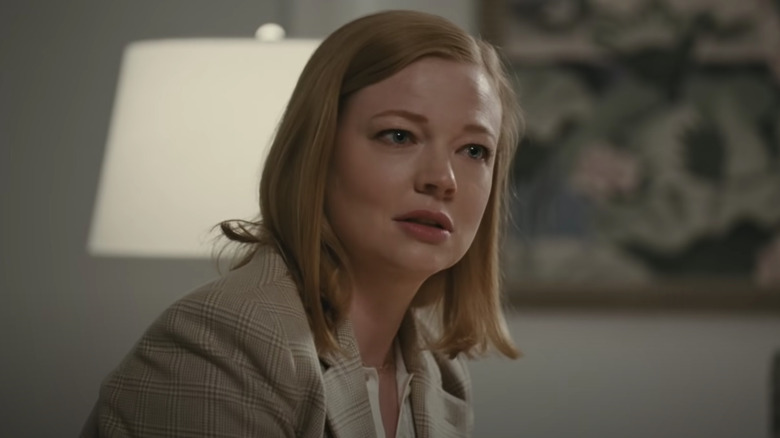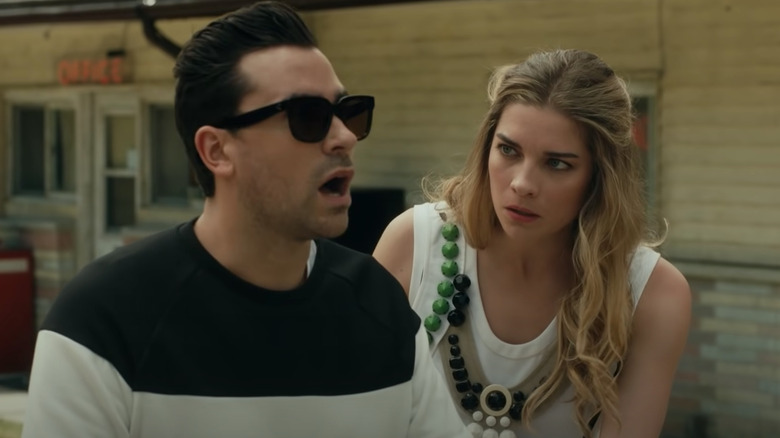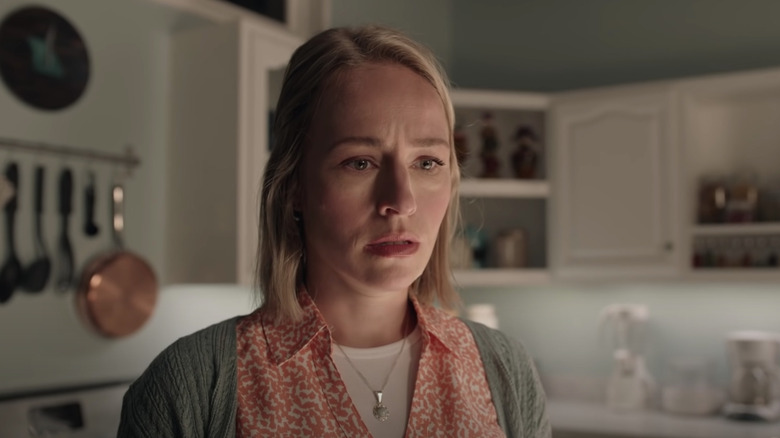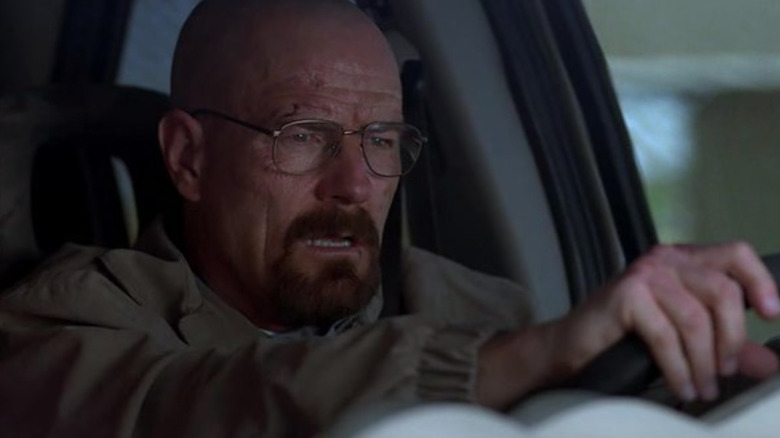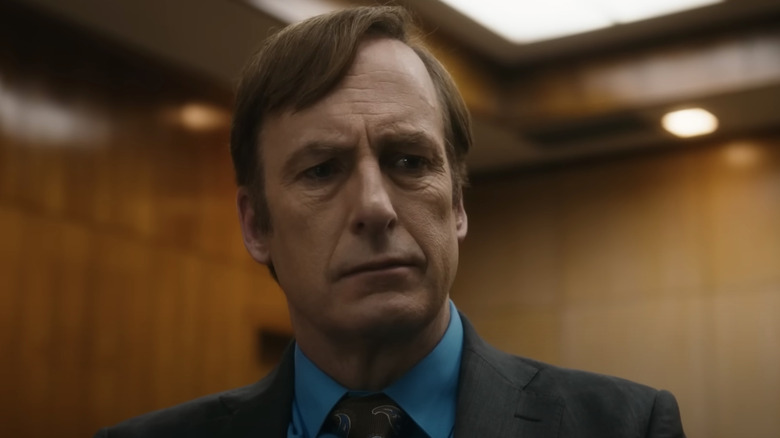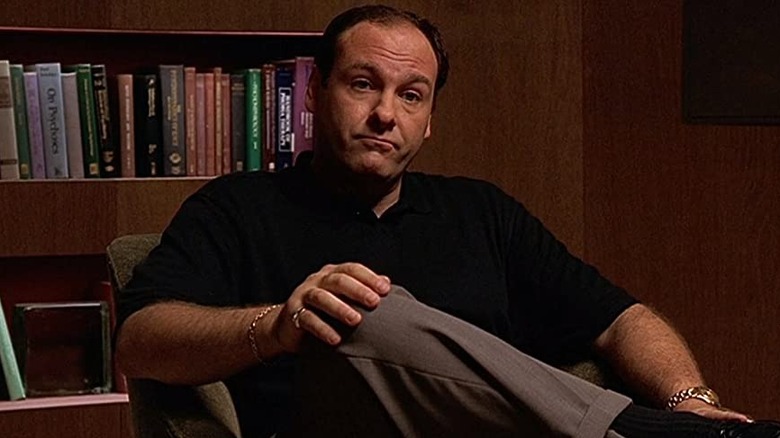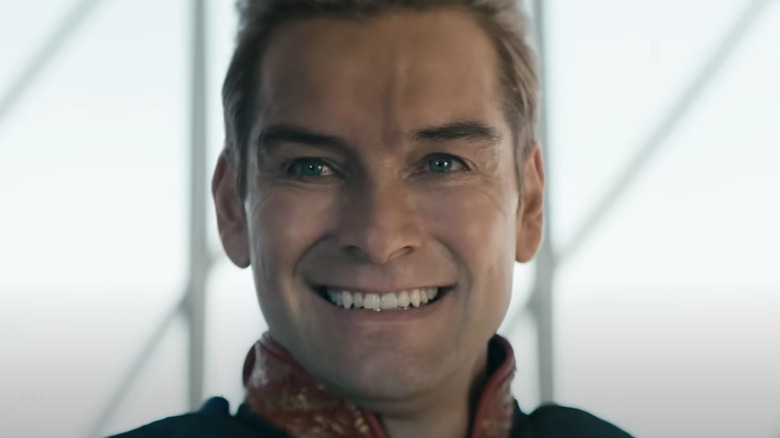Famous TV Shows That Have No Redeemable Characters
Classic forms of storytelling usually feature a struggle between good and evil as represented by a hero and a villain, from Odysseus vs. Cyclops to Batman vs. Joker. It's a simple, intuitive way to present dramatic conflict, but this black-and-white approach to right and wrong is only one way to structure a narrative.
In reality, the world is more flawed and morally gray. The world's imperfection can lead to cynicism or disappointment or simply be accepted as truth, but no matter how you view it, most people would agree that the predictability of the good guy prevailing becomes stale and tests believability. Instead, what happens when you put an immoral scumbag in similar situations? These famous TV shows took that question a step further and created a cast of characters with no redeemable qualities. These protagonists run the gamut from banal selfishness to full-blown murderous sociopathy, but all of them share a total lack of typical heroic characteristics.
Seinfeld
Maybe one of the earliest examples of TV's fascination with irredeemable characters, "Seinfeld" gave us characters who were deliberately flawed, vain, and insensitive. Created by comedians Larry David and Jerry Seinfeld, the show ran from 1989 to 1998. Jerry Seinfeld plays a semi-fictionalized version of himself as an up-and-coming stand-up comedian. He acts as the straight man for his eccentric friends, but that doesn't make him any better than the rest.
George Costanza is Jerry's best friend as well as a lying, jealous, desperate, cowardly loser. A few of his schemes involve lying about being handicapped to get a job, drugging his boss, and letting a serial killer escape from police custody. His cheapness results in the accidental death of his fiancée, which he's not-so-secretly pleased about. His only saving grace is that he's not Jerry's neurotic neighbor Kramer, who can be negligent of others, impulsive, and callous (and who recreationally beats children). Elaine Benes, the only woman in the friend group, is also selfish, manipulative, and cruel, traits that often land her in hot water.
Thankfully, all these traits create absurd situations that are played for laughs. In fact, the cast seemed witty, charming, and likable enough that many viewers took umbrage with the show's finale, which showed them getting their comeuppance. The fact that many of the storylines were based on the writers' real-life experiences likely made them more relatable. For example, the Season 7 episode "The Rye," wherein a loaf of rye causes conflict between George and his fiancée's parents, was based on a writer's high school friend's similar experience (via news.com.au). Still, if you met these characters in real life, their behavior would be appalling.
South Park
One of TV's most controversial shows, "South Park," is teeming with irredeemable characters. Just like the show, the characters push boundaries and challenge political correctness every chance they get. Stan Marsh, Kyle Broflovski, Eric Cartman, and Kenny McCormick may be a group of fourth graders, but don't be fooled: There is nothing innocent about these boys. Some of their horrible tendencies include Cartman cooking his bully's parents into chili and force-feeding it to him, Kyle kicking and abusing his baby brother, Stan ending a short-lived peace in the Middle East, and Kenny abetting the murder of Sarah Jessica Parker.
It's not just the main characters. Other recurring characters are just as bad, if not worse. The drug-addicted anthropomorphic towel, Towelie, is constantly trying to get the kids high. One of the other fourth graders, Butters, sinks a cruise ship. In a full-circle kind of moment, Butters' mother attempts to drown her son after a psychotic break. Satan and Saddam Hussein also make recurring appearances as lovers. The list goes on and on. The unapologetic absurdity of it all was unlike anything before. It was the first animated series to receive a TV-MA rating and remains one of the highest-rated series on Comedy Central. There's no denying the cultural impact these awful characters have made on the world.
Family Guy
The Griffin family from "Family Guy" runs a close second to the controversial kids in "South Park." The animated sitcom created by Seth MacFarlane revolves around the misadventures of Peter; his wife Lois; their kids Chris, Meg, and Stewie; and the anthropomorphic family dog Brian. The off-color comedy of the show takes the characters down some dark paths. The baby of the family, Stewie, should be the most innocent of them all, but we know better from covering "South Park." Stewie is constantly trying to kill his mother, a storyline that includes a two-part episode titled "Stewie Kills Lois" and "Lois Kills Stewie," where Stewie attempts to carry out his treacherous plan against Lois.
Okay, but the dog has to be harmless, right? No. A few of his irredeemable actions involve taking advantage of women and going on a shooting spree. The biggest offender of them all is Peter, who should probably be locked up by now for his criminal behavior. He robs a bank at gunpoint, commits treason, and abuses his entire family. So much for setting a good example for the rest. It's no wonder the rest of the Griffins take after him.
It's Always Sunny in Philadelphia
"It's Always Sunny in Philadelphia" premiered on FX on August 4, 2005, and still runs today on FXX, making it the longest-running live-action sitcom of all time (via NPR). It made waves when it first debuted for its controversial, off-the-wall comedic style and sociopathic characters. The demand for irredeemable characters is still alive and well. From dabbling in blackface to committing multiple accounts of attempted murder, friends Charlie, Dennis, Mac, Dee, and Frank ("The Gang") are some of the most unlikable characters to ever exist. But that just so happens to be the charm of it all.
There's not an ounce of shame or remorse for their criminal, immoral antics. In Season 4, Episode 8, "Paddy's Pub: The Worst Bar in Philadelphia," The Gang kidnaps a bar critic after a deserved bad review. In Season 4, Episode 12, "The Gang Gets Extreme: Home Makeover," The Gang burns down an immigrant family's home. One of The Gang's greatest sins of all was tricking Rickety Cricket out of the priesthood with a false promise, leading him to spiral out of control into homelessness and drug addiction. His misery doesn't stop there, as The Gang continues to cause him physical harm throughout the show. Maybe it's the dark comedy or morbid curiosity that keeps viewers coming back for more, but if there's one lesson we can learn from all this, it's to stay as far away from South Philadelphia as possible.
Shameless
Add Chicago's South Side to the list of places you should avoid, at least according to Showtime's comedy-drama series "Shameless." The Gallaghers are TV's most dysfunctional family, led by alcoholic father Frank, who neglects his six kids, Fiona, Lip, Ian, Debbie, Carl, and Liam. The oldest sibling, Fiona, is left to raise the rest of the kids on her own, but not even she can save them from their self-destructive destinies. Fiona may have stepped up when Frank wouldn't, but she's no saint either. On top of being a liar, manipulator, serial cheater, and homewrecker, one of the worst things Fiona has ever done is cause the youngest Gallagher, Liam, to have a nearly fatal drug overdose. Now that's a hard one to bounce back from.
The rest of the kids have their own problems in addition to their recurring petty criminality. The intellectual prodigy Lip uses his gift in all the wrong ways, like taking the SATs for other students or organizing wire fraud. Ian has kidnapped a baby and has sent at-risk youth to jail for his own benefit. Debbie lied about being on the pill and trapped her boyfriend with a pregnancy. Carl is an outright criminal, selling guns at school and dealing drugs. There was also the time when all the kids attempted to murder their father by throwing him off a bridge, though some could argue that was justifiable.
Succession
The Roys are another family you don't want to mess with. The owners of the global media and entertainment conglomerate Waystar RoyCo drive a conservative agenda and will do anything in their power to control public perception. When they're not wreaking havoc on each other's lives, they're ruining everyone else's. They are the antithesis of the phrase "with great power comes great responsibility," instead using their wealth and power only in service of acquiring more wealth and power. They freely and unapologetically manipulate, lie to, and blackmail others. They cover up scandals like it's a hobby and break the law like it's going out of style. Unlike the previous shows mentioned, there is nothing absurd about their irremediable behavior. While outrageous to us "everyday folks," these conflicts are common practice for real-life figures in similar positions. Esquire even draws parallels between News Corp owners the Murdochs and the Roy Family.
The show's deep roots in reality make the characters' actions even more reprehensible. Some of the horrible things this family has done include Shiv backing her husband into a corner on their wedding day with a request for an open relationship, cousin Greg covering up a massive scandal of abuse by shredding important documents (and Tom forcing Greg to shred said documents), Roman sexually harassing women, Logan verbally and emotionally abusing his children, and the most shocking of all, Kendall's recklessness and irresponsibility leading to the death of a young man. Unfortunately, when you get a taste of power, there's no going back.
Schitt's Creek
A more lighthearted approach to the dysfunctional family unit is the sitcom "Schitt's Creek," created by and starring father-son duo Eugene and Dan Levy. The wealthy Rose family must learn to cope without their riches after losing their family business from embezzlement.
A mix of eccentric, pretentious, and self-centered characters, the family always has internal strife as well as external drama with the townspeople they snub. This show takes the term "spoiled brat" to the next level. And we can't just solely blame the kids for how they grew up. With an unhinged mother like Moira and an absent father like Johnny, it doesn't take a genius to figure out why Alexis and David turned out the way they are. You can't even blame them for their behavior because the town of Schitt's Creek might possibly be one of the least charming, most unlikable towns to ever exist. Even the sweet-seeming Jocelyn shows her short fuse as the series progresses.
Although the characters redeem themselves by the heartwarming finale of this show, part of the fun at the start is seeing just how unlikeable they can really be.
Barry
"Barry" is a black comedy-drama about a hitman from the midwest joining an acting class while on a job in Los Angeles. Barry may be a cold-blooded killer, but there's still some hope Barry can change. After all, he's ready to leave his hitman life behind and turn a new leaf as an actor, even if he's not very good at it. This proves to be more difficult than he originally thought. No matter how hard he tries, Barry cannot escape his dark past. As each season progresses, it becomes impossible to juggle his double life as he becomes more and more unhinged.
In Season 1 alone, Barry kills more than 15 people. The cruelest is the murder of his acting teacher's girlfriend, Detective Janice Moss, after she figures out Barry's secret. The death toll increases in Season 2 when Barry goes on a killing spree in Episode 8, "berkman > block," as he hunts down his handler, Fuches. By Season 3, Barry will do anything to survive, including endangering those he loves most. When Barry isn't getting tied up with immoral criminals like Fuches and the Chechen mafia, he's corrupting everyone else around him.
Breaking Bad
Walter White is another man trying to balance a double life in the crime drama series "Breaking Bad." His dark descent from modest high-school chemistry teacher to ruthless drug kingpin is one of the best antihero story arcs in TV history. Creator Vince Gilligan suggests it takes fresh eyes years later to truly understand how irredeemable Walter truly is, saying, "He was really sanctimonious, and he was really full of himself. He had an ego the size of California. And he always saw himself as a victim. He was constantly griping about how the world shortchanged him, how his brilliance was never given its due. When you take all of that into consideration, you wind up saying, 'Why was I rooting for this guy?'" (via Variety).
While hard to compare to the villainous nature of Walter, the other characters have trouble redeeming themselves as well. His partner and former student Jesse Pinkman helps Walter cook and sell meth. Aiding Walter in all his criminal behavior means getting caught up in the deaths of multiple characters. Walter is also to blame for Skylar turning into a white-collar criminal, as she has to launder Walter's money to keep her family safe. Skylar's sister Marie is not only a shoplifter, but she also kidnaps baby Holly from Skyler after learning the truth about Walter's drug empire. Marie's husband and Walter's brother-in-law Hank tries to be the hero, but his short temper leads him to do some questionable deeds, like beating Jesse nearly to death. And the criminal lawyer Saul Goodman? Boy, does he have a story.
Better Call Saul
Before he became Walter White's lawyer in "Breaking Bad," Saul Goodman was known as Jimmy McGill, a struggling public defense lawyer living in the shadow of his brother and fellow lawyer, Chuck McGill. In this spin-off to "Breaking Bad," we learn about Saul's past and how he came to be the sleazy lawyer we know him to be in "Breaking Bad." Jimmy spent his youth as a con artist. After some trouble with the law, he decided to follow the path of his brother and become a lawyer. When that doesn't really work out for him, he leans back into his scamming tendencies. These scams lead to some pretty irredeemable actions, like falsifying legal documents, turning an elderly woman's friends against her so she settles on a case, demolishing his brother's reputation, and corrupting Kim with his unethical schemes.
Don't feel too bad for these other characters, though, because they're not exactly heroes. Chuck is constantly getting in the way of Jimmy's success and ruining his career; Kim lies about her identity to help Jimmy with his swindling, sabotages Howard's reputation, and causes his death; and Mike is a cold-blooded killer along with everyone else working in the drug cartel. Some would go as far as to say these acts are unforgivable.
The Sopranos
Before "Breaking Bad," there was "The Sopranos," a popular and critically revered crime drama series following the Italian mob in New Jersey. The show changed the way we think of heroes and villains in TV, with LIFE crediting it for "pushing creative and moral boundaries along with audience expectations" and "[influencing] a raft of prestige TV that followed in its wake."
"The Sopranos" centers around Tony Soprano (James Gandolfini), a mobster trying to balance two lives at odds: his mobster family and his blood family. When you're dealing with violent gangsters, it's only natural to run into some criminal activity. It doesn't get much worse than the cold-blooded killings carried out by multiple characters: Tony killing his cousin, Chris killing J.T. Dolan, Silvio killing Adriana — not to mention all the truly innocent lives lost throughout. The dark burden of this kind of lifestyle carries into the real world, with one former HBO executive stating, "Tony's struggles not only mirrored Jimmy's (James Gandolfini's) struggles, they amplified Jimmy's struggles and what Jimmy felt" (via Insider). It takes a real toll to embody someone as irredeemable as Tony Soprano.
The Boys
At least mobsters don't have superpowers that they use for evil like the characters from "The Boys." In the blink of an eye, any one of the Supes can (and do) kill any mere mortal. In the pilot episode, Hughie's girlfriend is brutally murdered by the careless and reckless A-Train. This drives him to join a group of vigilantes trying to put a stop to the superhero corruption of Vought International called the Boys, led by the biggest Supe-hater of all, Butcher. Vought oversees all superheroes, including the powerful, popular group known as The Seven. The CEO of Vought, Stan Edgar, is a ruthless puppet master who causes political corruption throughout the nation. However, no one is as threatening as the leader of The Seven, Homelander. Created in a Vought lab, Homelander has the unstoppable power of a god. He prefers to be loved, but if he needs to be feared to get what he wants, so be it.
The Boys will also do whatever it takes to get what they want. They intend to put a stop to Homelander and Vought, but they have to do some irredeemable things along the way. Butcher is a former member of the British special forces who puts everyone else in danger, including innocent civilians, for the sole purpose of his vendetta against Supes. The rest of the members of The Boys also have a twisted set of morals that make it difficult for them to redeem themselves, even when they so desperately try to make the right choices. In "The Boys" universe, there are no real heroes, only villains playing dress-up.
